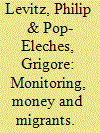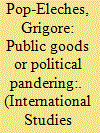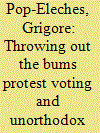| Srl | Item |
| 1 |
ID:
095280


|
|
|
|
|
| Publication |
2010.
|
| Summary/Abstract |
Using cross-national governance indicators and evidence from a recent Bulgarian survey, this essay examines political reforms in Bulgaria and Romania since EU accession and, in particular, the 'backsliding' hypothesis-that these countries have abandoned or reversed the reforms they introduced in order to qualify for membership of the European Union. It finds no systematic evidence either that these countries have been backsliding or that their trajectories differ significantly from their first-wave Central and East European neighbours, though governance reforms have slowed after accession. The second part of the essay focuses on the mechanisms responsible for the lack of significant backsliding, emphasising the role of continued conditionality through the safeguard clauses, EU funding and increasing linkage between new and old EU members, including opportunities for East Europeans to work and travel in Western Europe.
|
|
|
|
|
|
|
|
|
|
|
|
|
|
|
|
| 2 |
ID:
091032


|
|
|
|
|
| Publication |
2009.
|
| Summary/Abstract |
This article uses empirical evidence from Latin American and East European International Monetary Fund (IMF) programs from 1982 to 2001 to analyze the nature and the extent of preferential lending practices by the IMF. Unlike prior work, which focused on narrow political interference from large IMF member states, the present analysis differentiates between such narrow interests and the Fund's international systemic responsibilities, which may justify the preferential treatment of systemically important countries to prevent broader regional or global crises. The empirical results suggest that systemically based deviations from technocratic impartiality predominate in situations-such as the Latin American debt crisis-where international financial stability is under serious threat. Under such circumstances, economically important countries do receive preferential IMF treatment but only when experiencing severe crises, while narrow "private goods" considerations are largely sidelined. When systemic threats are less immediate-such as in Latin America and Eastern Europe in the 1990s-IMF favoritism reflects a more volatile and region-specific mix of private and public considerations in line with the changing interests of powerful Western nations in the developing world.
|
|
|
|
|
|
|
|
|
|
|
|
|
|
|
|
| 3 |
ID:
095082


|
|
|
|
|
| Publication |
2010.
|
| Summary/Abstract |
The electoral rise of unorthodox parties (UOPs) in recent East European elections raises some puzzling questions about electoral dynamics in new democracies. Why did the power alternation of the mid-1990s not result in party-system consolidation, as suggested by some earlier studies, but instead give way to a much more chaotic environment in which established mainstream political parties lost considerable ground to new political formations based on personalist and populist appeals? Why did this reversal in Eastern Europe happen during a period of economic recovery, remarkable Western integration progress, and a broad acceptance of electoral democracy as the only game in town? This article suggests that these electoral dynamics can be explained by focusing on the interaction between protest voting and election sequence. While protest voting to punish unpopular incumbents has been a widespread but understudied practice since the collapse of communism, the beneficiaries of these protest votes have changed in recent elections. Whereas in the first two generations of postcommunist elections, disgruntled voters could opt for untried mainstream alternatives, in third-generation elections (defined as elections taking place after at least two different ideological camps have governed in the postcommunist period) voters had fewer untried mainstream alternatives, and therefore opted in greater number for unorthodox parties. This explanation receives strong empirical support from statistical tests using aggregate data from seventy-six parliamentary elections in fourteen East European countries from 1990 to 2006, survey evidence from twelve postcommunist elections from 1996 to 2004, and a survey experiment in Bulgaria in 2008.
|
|
|
|
|
|
|
|
|
|
|
|
|
|
|
|